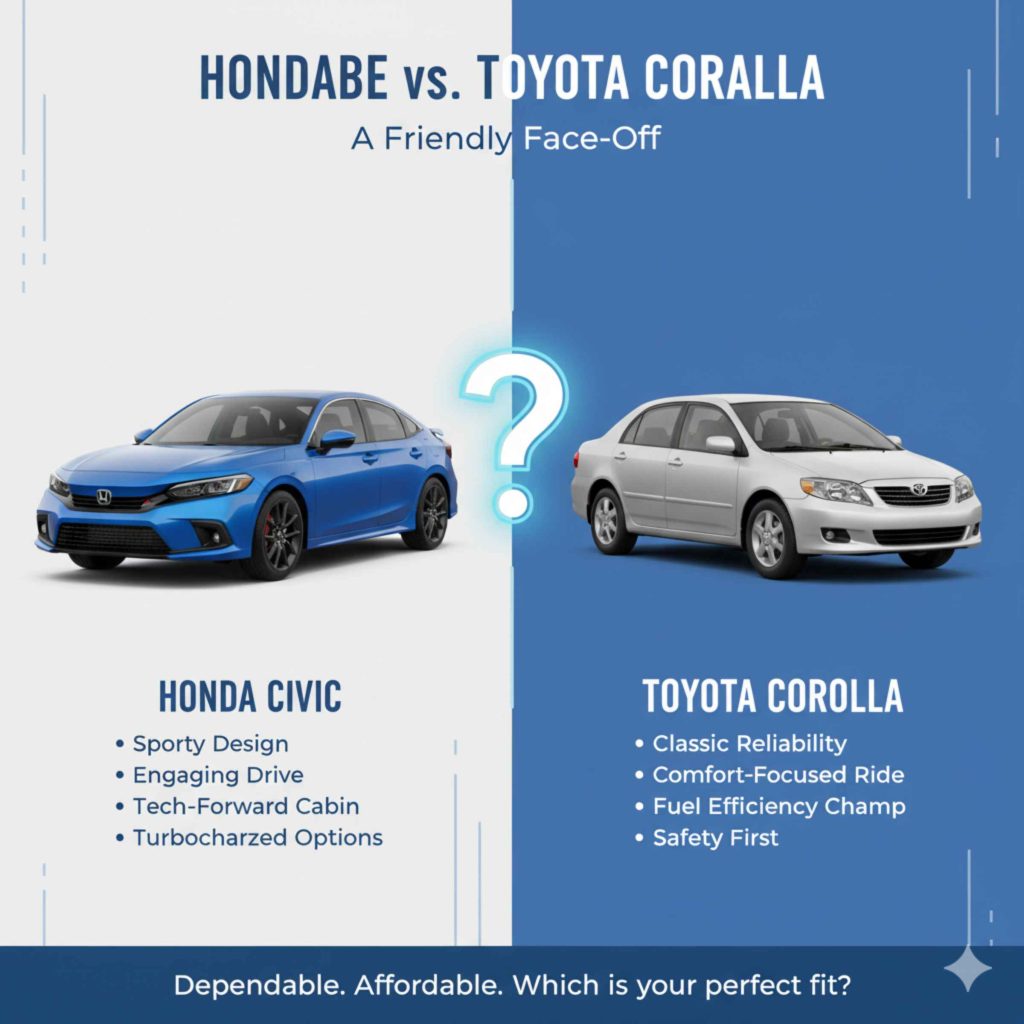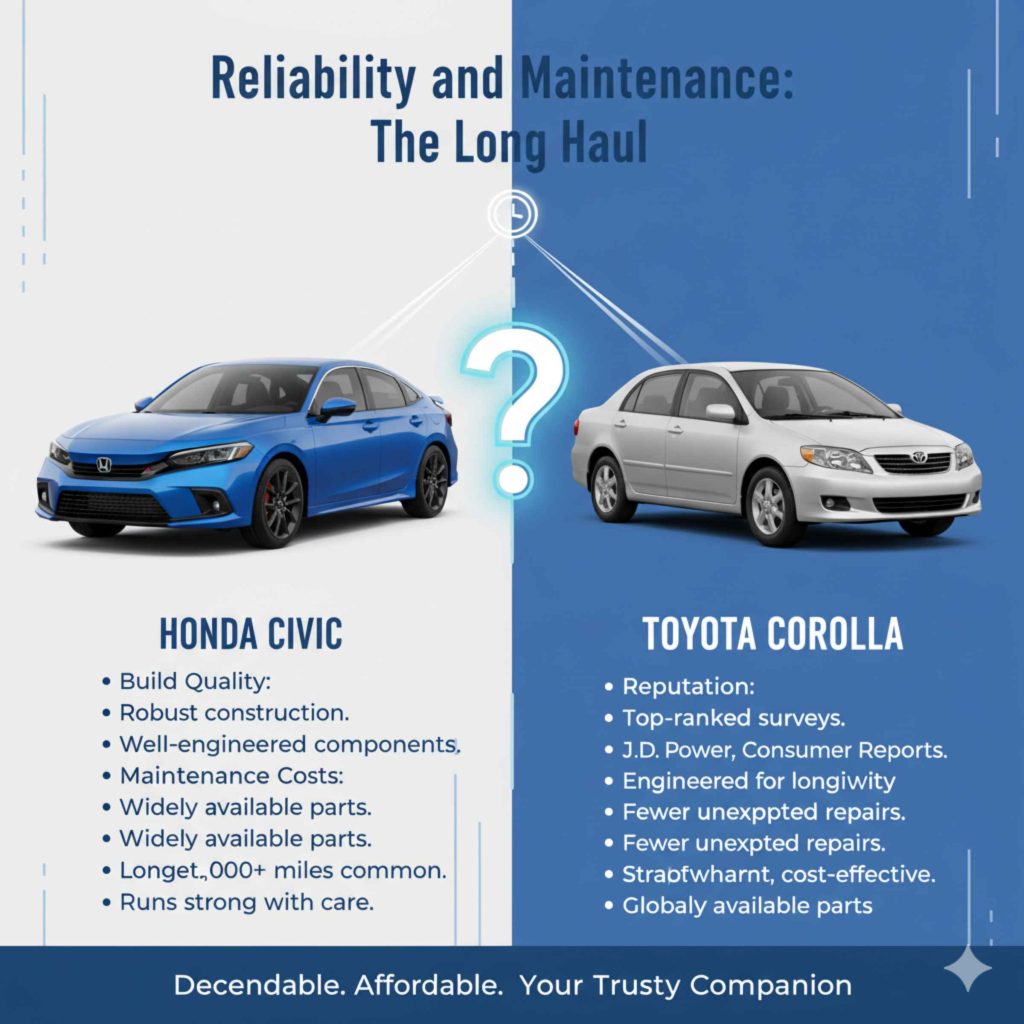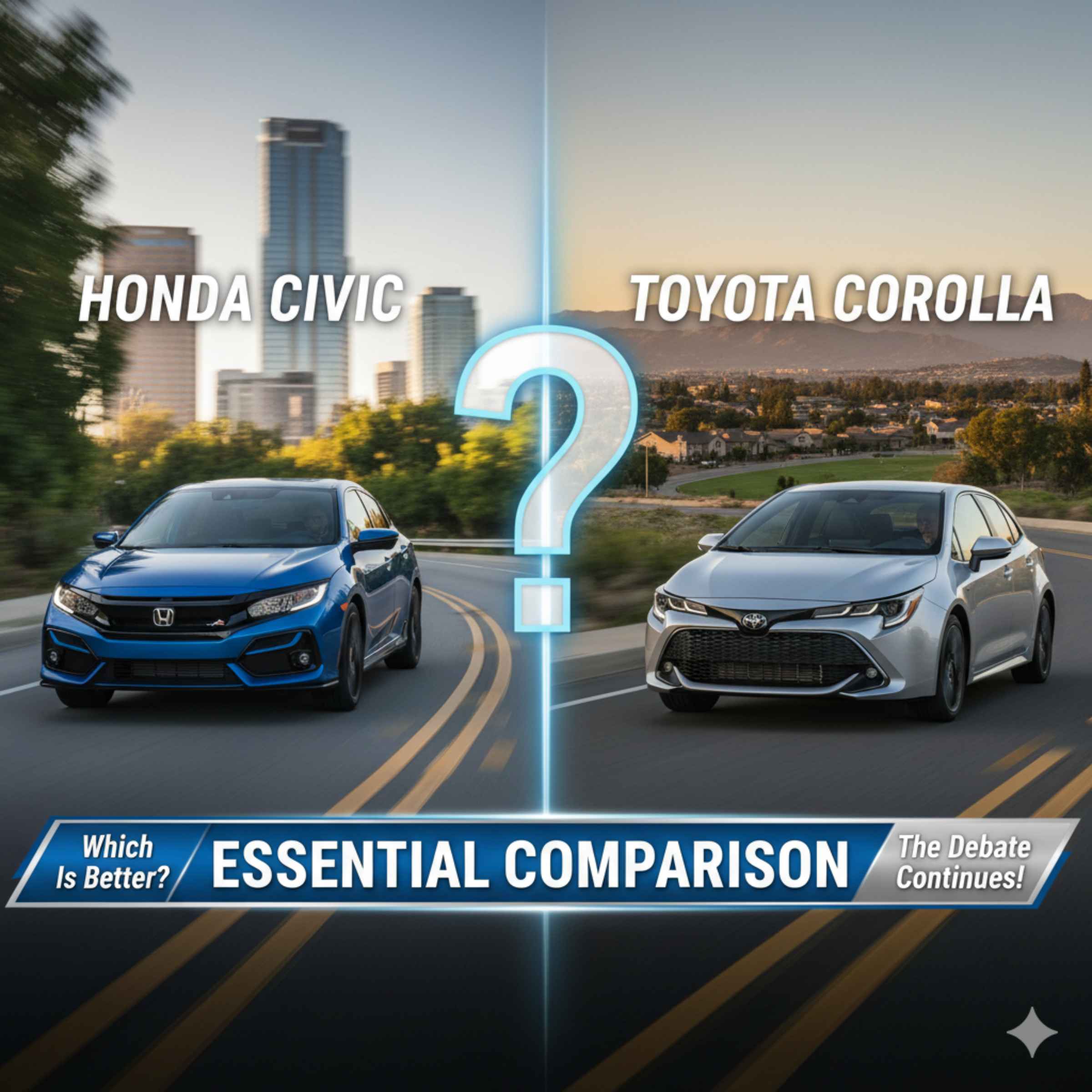Quick Summary
Choosing between the Honda Civic and Toyota Corolla often comes down to personal preference, as both are excellent, reliable compact cars. The Civic typically offers a more engaging driving experience and sportier design, while the Corolla is renowned for its unparalleled long-term reliability and comfortable, straightforward operation.
The annual battle of the compact car titans is here again! When you’re looking for a solid, dependable ride that won’t break the bank, the Honda Civic and Toyota Corolla are usually at the top of the list. It’s a classic showdown because both cars have earned a stellar reputation for being reliable, fuel-efficient, and practical. But which one is truly the best fit for you?
It can feel overwhelming trying to sort through all the specs and features. Will you get a fun drive or ultimate peace of mind? Do you prioritize tech or a smooth, quiet ride? We’ve got you covered. Let’s break down the Honda Civic vs. Toyota Corolla comparison in a way that makes sense, helping you drive away with confidence.
Honda Civic vs. Toyota Corolla: A Friendly Face-Off
For decades, the Honda Civic and Toyota Corolla have been the go-to choices for drivers seeking a solid, affordable, and reliable car. They’re like the comfortable pair of jeans in your closet – dependable and always a good fit. But just like choosing between those jeans and your favorite t-shirt, sometimes you want something a little different.
Honda and Toyota have perfected these models over many years, making them incredibly competitive. This comparison isn’t about declaring one a “winner” in every sense, but rather helping you understand what makes each car special, so you can pick the one that aligns with your driving style and needs.

Performance and Driving Dynamics: Who’s More Fun?
When you’re behind the wheel, how the car feels is super important. Do you like a car that feels zippy and responsive, or one that’s more about a smooth, easy journey? This is where the Civic and Corolla often show their most significant differences.
Honda Civic: The Sporty Challenger
The Honda Civic has historically been the choice for drivers who enjoy a more engaging driving experience. Think of it as the car that feels a bit more alive on the road.
Handling: Civics are generally praised for their sharper handling and more connected feel to the road. When you take curves, it often feels more planted and confident.
Engine Options: While both base engines are efficient, higher trims of the Civic often offer more potent turbocharged options that add a noticeable kick.
Transmission: Many drivers appreciate the responsiveness of the Civic’s available transmissions, whether it’s a manual (for the enthusiasts!) or a continuously variable transmission (CVT) that’s tuned for a sportier feel.
Suspension: The suspension is typically tuned to offer a good balance between comfort and athleticism, meaning it handles bumps well but also keeps the car stable during spirited driving.
Toyota Corolla: The Smooth Operator
The Toyota Corolla has long prioritized comfort and a relaxed driving experience. It’s built for everyday commuting and long drives where comfort is key.
Ride Quality: Corolla is known for its exceptionally smooth and quiet ride. It does a fantastic job of soaking up imperfections in the road, making for a very serene cabin.
Engine Performance: Corolla’s standard engines are designed for maximum efficiency and reliability. While they provide enough power for daily driving, they don’t typically offer the same level of acceleration as the Civic’s sportier options.
Steering: The steering is usually light and easy, making it a breeze to maneuver in city traffic and parking lots.
Hybrid Option: A major advantage for the Corolla is its highly efficient hybrid model, which offers incredible fuel economy without a significant compromise in practicality.
Fuel Economy: Saving at the Pump
Let’s talk about the numbers that matter most for your wallet: MPG! Both the Civic and Corolla are champions of fuel efficiency, which is a huge reason for their popularity.
Honda Civic Fuel Economy
The standard gasoline-powered Honda Civic is very competitive. You can expect excellent mileage, especially with its continuously variable transmission (CVT).
For example, a recent model Civic sedan with a 1.5L turbocharged engine can achieve ratings like:
- City: Around 33 MPG
- Highway: Around 42 MPG
- Combined: Around 36 MPG
These figures can vary slightly depending on the specific trim and year of the model. For the latest official EPA estimates, you can always check resources like fueleconomy.gov.
Toyota Corolla Fuel Economy
The Toyota Corolla often shines brightest with its hybrid variant, which is one of the most fuel-efficient cars in its class, if not the entire market for non-plug-in vehicles.
Here’s a general idea for recent models:
- Standard Gasoline Engine: Typically achieves around 30 MPG city / 38 MPG highway / 33 MPG combined.
- Corolla Hybrid: This is where it really stands out, often achieving rates like 53 MPG city / 52 MPG highway / 52 MPG combined.
Again, always check the EPA’s official ratings for the exact model year and configuration you’re considering.
Interior and Technology: What’s Inside Matters
The cabin of your car is where you’ll spend most of your time, so comfort, usability, and the tech features are crucial. Both cars offer modern interiors, but they have different approaches.
Honda Civic Interior and Tech
The Honda Civic often presents a more modern and dynamic interior design. It tries to balance a clean look with sporty elements.
Design: Recent Civic generations feature stylish interior designs, often with unique elements like a honeycomb mesh strip across the dashboard that hides the air vents.
Infotainment: Touchscreen systems are standard, supporting Apple CarPlay and Android Auto. The user interface is generally intuitive and easy to navigate. Higher trims offer larger screens and premium audio systems.
Comfort and Space: The Civic typically offers comfortable seating and a surprisingly spacious cabin for its class, with good legroom in both the front and rear. Trunk space is also generally ample for a compact car.
Materials: While still a compact car, higher trims of the Civic often use slightly more upscale materials, contributing to a more premium feel.
Toyota Corolla Interior and Tech
The Toyota Corolla’s interior is designed with simplicity, durability, and ease of use in mind. It’s less about flash and more about straightforward functionality.
Layout: The dashboard is clean and uncluttered, with all controls logically placed. It prioritizes ease of access for everything you need.
Infotainment: Similar to the Civic, the Corolla comes equipped with touchscreen infotainment systems supporting smartphone integration (Apple CarPlay/Android Auto). Toyota’s systems are known for being user-friendly and reliable.
Comfort and Ergonomics: Seating is comfortable, designed for support on longer journeys. Ergonomics are excellent, with controls easy to reach and use without distraction.
Durability: Toyota interiors are renowned for their long-term durability. Materials might not always feel as premium as a top-trim Civic, but they are built to last and withstand daily wear and tear exceptionally well.
Safety Features: Peace of Mind on the Road
Safety is paramount, and both Honda and Toyota are leaders in offering advanced safety technologies in their mainstream vehicles.
Honda Civic Safety
The Honda Civic consistently earns top safety ratings. Honda’s suite of active safety and driver-assist features, known as Honda Sensing, is often standard or widely available.
Honda Sensing Includes:
Collision Mitigation Braking System (CMBS)
Road Departure Mitigation System (RDM)
Adaptive Cruise Control (ACC)
Lane Keeping Assist System (LKAS)
Traffic Sign Recognition
Crash Test Ratings: The Civic typically performs exceptionally well in crash tests conducted by organizations like the National Highway Traffic Safety Administration (NHTSA) and the Insurance Institute for Highway Safety (IIHS).
Toyota Corolla Safety
The Toyota Corolla also boasts excellent safety credentials, often coming standard with Toyota Safety Sense.
Toyota Safety Sense (TSS) Includes:
Pre-Collision System with Pedestrian Detection
Lane Departure Alert with Steering Assist
Automatic High Beams
Dynamic Radar Cruise Control
Lane Tracing Assist (on some models)
Crash Test Ratings: Like the Civic, the Corolla is a star performer in safety evaluations. You can find detailed reports from NHTSA and IIHS.
Reliability and Maintenance: The Long Haul
This is where both cars truly shine and why they are practically synonymous with dependability. When it comes to long-term reliability and ease of maintenance, both the Civic and Corolla are hard to beat.
Honda Civic Reliability
Honda has built a formidable reputation for reliability, and the Civic is a prime example.
Build Quality: Civics are known for their robust construction and well-engineered components that tend to last.
Maintenance Costs: Routine maintenance is generally affordable. Parts are widely available, and many common tasks can be handled by independent mechanics, not just dealerships.
Longevity: It’s not uncommon to see Honda Civics with well over 200,000 miles on the odometer, still running strong with proper care.
Toyota Corolla Reliability
Toyota’s legendary reliability is almost a given, and the Corolla carries that torch proudly.
Reputation: Toyota, as a brand, consistently ranks at the top for reliability surveys from organizations like J.D. Power and Consumer Reports.
Durability: Corolla components are engineered for longevity. This often translates to fewer unexpected repairs over the lifespan of the vehicle.
Maintenance Simplicity: Routine services are straightforward and cost-effective. Parts are readily available globally, contributing to accessible repair and maintenance.

Which Is Better: Civic or Corolla? A Summary Table
To help you visualize the differences, here’s a handy comparison table for recent model years. Keep in mind that specific features can vary greatly by trim level and model year.
| Feature | Honda Civic | Toyota Corolla |
|---|---|---|
| Driving Feel | More engaging, sportier handling, responsive. | Smoother, more comfortable, easier to drive. |
| Engine Options | Efficient base; sportier turbocharged options in higher trims. | Fuel-efficient base; very strong hybrid option. |
| Interior Design | Modern, stylish, sometimes with unique aesthetic touches. | Straightforward, practical, durable, user-friendly. |
| Technology | User-friendly infotainment, Apple CarPlay/Android Auto. | Easy-to-use infotainment, Apple CarPlay/Android Auto, strong hybrid tech. |
| Standard Safety | Honda Sensing suite widely available. | Toyota Safety Sense suite widely available. |
| Overall Reliability | Excellent, consistently high ratings. | Legendary, often considered class-leading. |
| Fuel Economy | Very good; competitive with gas engines. | Excellent, especially with the hybrid model. |
| Potential Drawbacks | Can be slightly less refined in base trims; some might find it “too sporty.” | Base engines can feel a bit underpowered for some; driving dynamics less engaging. |
| Who is it For? | Drivers seeking a more dynamic driving experience, modern styling, and good performance. | Drivers prioritizing ultimate reliability, fuel efficiency (especially hybrid), comfort, and ease of use. |
Pricing and Value: What’s Your Budget?
Both the Honda Civic and Toyota Corolla are positioned as value-oriented compact cars, meaning they offer a lot of bang for your buck.
New Car Pricing: Typically, their starting MSRPs are very close, often placing them head-to-head. Minor differences can exist based on the specific model year, trim level, and current market conditions.
Used Car Market: Due to their legendary reliability, both models hold their value exceptionally well in the used car market. This means you might pay a bit more for a used Civic or Corolla compared to some competitors, but you’re investing in a vehicle known to last.
* Total Cost of Ownership: When you factor in fuel efficiency, lower insurance premiums, affordable maintenance, and excellent reliability (leading to fewer costly surprise repairs), both the Civic and Corolla typically offer an extremely low total cost of ownership over several years. The Corolla Hybrid, in particular, can offer significant savings on fuel over its lifetime.
FAQs: Your Top Questions Answered
Q1: Which car is more reliable, the Honda Civic or Toyota Corolla?
Both are exceptionally reliable! Toyota often gets a slight edge in long-term reliability surveys, with the Corolla being a standout. However, Honda Civics are also known for their durability and can last for hundreds of thousands of miles with proper care.
Q2: Which car is better on gas?
For pure fuel efficiency, the Toyota Corolla Hybrid is usually the winner, offering some of the best MPG ratings available. Standard gasoline versions of both the Civic and Corolla are very fuel-efficient and competitive with each other.
Q3: Which car is more fun to drive?
The Honda Civic typically offers a more engaging and sporty driving experience with sharper handling. The Toyota Corolla prioritizes a smooth, comfortable, and relaxed ride, which some drivers might find less exciting but more comfortable for daily commutes.
Q4: Which car has more interior space?
Both offer good interior space for the compact segment. Recent Honda Civic models often feel a bit more spacious, particularly in the rear. However, both are very capable of comfortably seating four adults for shorter trips, and five for shorter distances.
Q5: Which car is safer?
Both cars are very safe and consistently earn top safety ratings from agencies like NHTSA and IIHS. Both come standard with comprehensive suites of advanced driver-assistance systems (Honda Sensing vs. Toyota Safety Sense).
Q6: Which car is more affordable?
When new, their starting prices are very similar. The overall cost of ownership (fuel, maintenance, repairs) is also very low for both. Resale value is excellent for both, so they hold their worth well over time.
Making Your Choice: It’s All About You!
So, which one is the “better” car? The honest answer is: it depends entirely on what you value most in a vehicle.
If you’re someone who enjoys the act of driving, appreciates responsive handling, and perhaps fancies a bit of sporty flair in your everyday car, the Honda Civic might be your perfect match. It offers a compelling blend of efficiency, modern tech, and a dynamic feel that makes commuting more enjoyable.
On the other hand, if your priority is absolute peace of mind, legendary long-term reliability, a supremely comfortable and quiet cabin, and the best possible fuel economy (especially with the hybrid option), then the Toyota Corolla is likely the car for you. It’s the quintessential reliable companion that will get you from A to B with minimal fuss for years and years.
Both cars represent smart choices in the compact segment. They’ve earned their reputations for a reason. Take them both for a test drive, compare the features that matter most to you, and trust your instincts. Whichever you choose, you’re likely getting a fantastic vehicle that will serve you well. Happy driving!

